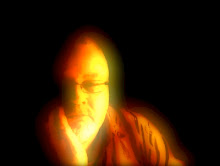Black
Words on a white page
Silence in a stifling room
Windows closed with light
Trapped in beads of dampness
Like a fresnel screen across the world
Held still by time’s shuddering to a stop
By conglomerate greens and browns
Natural form’s frozen death
Atrophied in an image
A photograph
Forgotten
No-one
In that room
Of panelled wood
Can articulate a vowel
No consonant will sound
Not the creaking board walls
Nor the wind’s whisper in the eaves
Likewise no-one reads the text
Nor breathes life into its black
On white scrawled meaning
Who speaks its language
Who even knows it
Or its unuttered
Words
What
Is written
Is empty scripture
Is a script a book of days
Trivially filled with time’s idleness
Facts and fictions compiled in lines
Rendered down to inarticulate nothing
In that dust-gathering room and its cold
Fireplaces its empty chairs dry books
On cupboard shelves limp drapes
Hanging back for want of air
Nothing at all nothing
Remembered
Someone
From outside
Swings the glass door wide
Into the stained pine hallway
Sends an edddy across threadbare rugs
Moves the flat white paper hastily rustles it
From still to rest creased and patient its words
Like dark hearts beat in the brightening pooling light
A hand lifts it to read its strung-out meaning
Turns words to thought and then from eyes
To lips breathes inhales lungs inflate
And on the out-breath curl sound
Around them fills their shapes
With a different kind of life
And the room the world
Floods with story
Finds its
Voice
© BH,2017
Following a piece on Nathan Machart's blog about Nathan finding his voice as a writer, I thought I’d explore the notion of voice in relation to writing myself.
So, here is something on the matter, conjured out of somewhere. I've written lots of poetry over the years and performed a few. Understanding your voice (or voices) is a long-term task. Maybe as important is understanding your own register: a bit like playing an instrument - how to reach the high notes and make them seem effortless or ease out the low notes and keep them resonant.
Then there are all the other voices you want to echo and keep true while doing that in your voice. So many levels!
In the end, writing without voice, either contained in it or used to express words on the page, can just be words in a long line, expressionless.
As I was writing this, I had an image of a nearby highland lodge where we sometimes walk and where, most often, no-one is in residence. Then if you peer in the windows, you see dark pine panels and old, if well-to-do, furniture set out on rugs and wooden floors.
It was the idea of that interior that underscored this; how what is written can languish until something or someone animates it.
- The image is a crow on my very own gate, tree roots at Loch an Eilean and a very indistinct mouth.


No comments:
Post a Comment